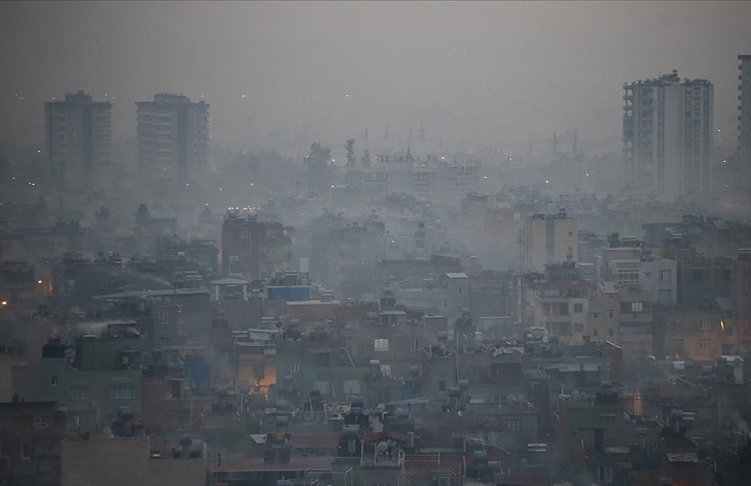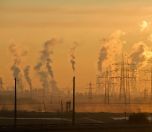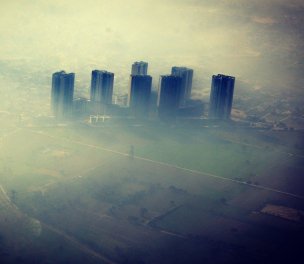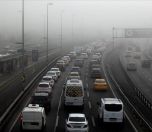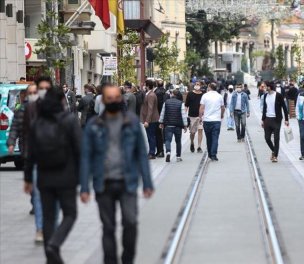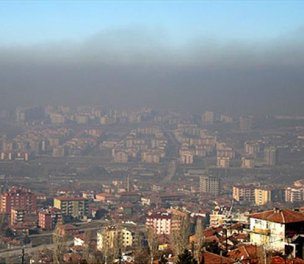Photo: AA/File
Click to read the article in Turkish
NGOs that have come together for the Collaboration Project for Environment, Climate and Health (ÇİSİP) and the Right to Clean Air Platform have reiterated their call for the government to comply with the World Health Organization's (WHO) updated air quality limit values.
Turkey's national limit value for PM10, that is, any particulate matter in the air with a diameter of 10 micrometers or fewer, is twice as high even the WHO's previous limit value. The amount of PM2.5 is not properly measured in the country.
The PM2.5 limit value determined by the Ministry of Environment in draft regulations for 2029 and beyond is five times higher than the WHO limit.
The new regulation, which was prepared as part of the EU harmonization process, is far from ideal, according to ÇİSİP. "Although it has not yet come into force, the PM2.5 limit value in the draft legislation is aimed to decrease from 30 μg/m3 annually in 2021 to 25 μg/m3 by 2029. However, these values are almost 5-6 times higher than the new limit value set by WHO as 5 μg/m3."
Preventable deaths
According to calculations by experts with the ÇİSİP and the platform, Turkey could have prevented 45,000 premature deaths annually even by achieving the WHO's old limits values. Air pollution is estimated to cause about eight million deaths worldwide annually.
Between 2017 and 2019, air pollution caused more than six times the deaths caused by traffic accidents, they found. If Turkey's air pollution was within the WHO limits, 7.9 percent of all deaths in 2019 and 12.13 percent of all deaths in 2018 could have been prevented.
Assoc. Prof. Semih Ayta, a pediatric neurology specialist in the team of experts, said, "There are almost no organs and systems that are not affected by air pollution. Especially the cardiovascular and respiratory systems are affected more.
"While the risk of cardiovascular diseases increases with the level and duration of exposure, studies have concluded that there is no safe threshold value. It is accepted that exposure to heavy metals such as methyl mercury and lead in the womb can affect the IQ levels of the child.
"Studies with pediatric patients reveal a possible intermediary role of gene-specific DNA methylations between air pollution and asthma attacks."
Prof. Çiğdem Çağlayan, a public health specialist, said 19 million children aged between 0 and 14 were exposed to 49 μg/m3 of PM10 on average in 2018, according to their estimates.
Had the air pollution in the country been within the WHO limit values, she said, 8,959 hospital admissions, 17.8 percent of the acute deaths and 11.9 percent of the infant deaths could have been prevented, she said.
WHO values and Turkey
|
About ÇİSİP
The Collaboration for Environment, Climate and Health Project was launched in April 2020 by the Health and Environment Association (HEAL), the Association of Public Health Specialists (HASUDER) and Kocaeli University Public Health Department, to bring together all actors working in the environmental health field.
About the Right to Clean Air Platform
The Platform comprises 16 organizations and has been working on air pollution in Turkey since 2015.
According to its website, the aim of the Platform is to advocate for the right to live in an environment with clean air and to protect the public health from the air pollution, especially resulting from the existing and the planned coal fired power plants in Turkey.
Platform Constituents are: CAN Europe, General Practitioner Association of Turkey, Greenpeace Mediterranean, Greenpeace Law Association, Green Thought Association, Health and Environment Alliance (HEAL), Physicians for Environment Association, TEMA Foundation (The Turkish Foundation for Combating Soil Erosion, for Reforestation and the Protection of Natural Habitats), Turkish Medical Association (TTB), Turkish Neurological Society, Turkish Respiratory Society, Turkish Society of Occupational Health Specialists (İMUD), Turkish Society of Public Health Specialists (HASUDER), Yuva Association, WWF Turkey, 350.org. (SO/NÖ/VK)




